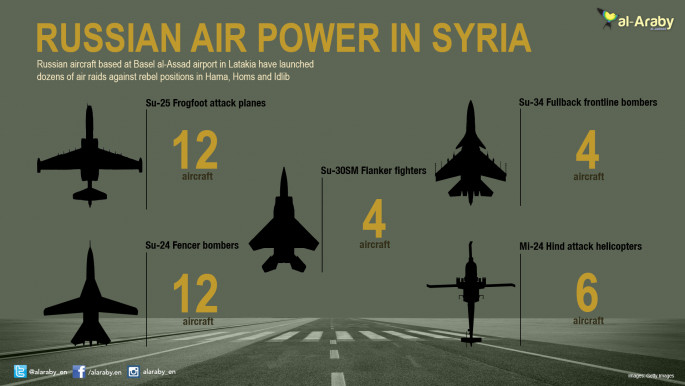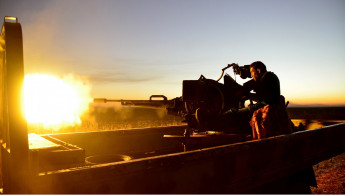Russia pounds Syria rebels near site of downed jet
Russian warplanes also bombed areas in southern and western Aleppo, as well as positions on the outskirts of al-Tabaqa in the Raqqa province, according to activists on the ground.
"Russian places staged seven airstrikes near the towns of Tabaqa and Dibsi Afnan, targeting grain silos where Islamic State militants are holed up," activist Muhab Nasser told al-Araby al-Jadeed.
|
||
In Latakia, at least 12 airstrikes hit the northern countryside as pro-government forces clashed with fighters from al-Qaeda's Nusra Front and Turkmen insurgents in the Jabal Akrad and Jabal Turkman areas, the British-based Syrian Observatory for Human Rights said.
A Turkmen commander said missiles fired from Russian warships in the Mediterranean were also hitting the area, as well as heavy artillery shelling.
Hassan Haj Ali, the head of Liwa Suqour al-Jabal, a rebel group operating in western Syria, also said there were fierce battles in the area, with Russian aircraft supporting pro-government forces.
There have been strikes for several weeks in Latakia province, whose capital of the same name is Assad's coastal stronghold, but the Observatory said Wednesday's bombardments were particularly heavy.
Rebels regain the initiative
Syrian rebel groups regained the initiative in the western countryside of Aleppo in the past two days, after the regime had made some significant gains, according to ground reports.
Fighters from the Free Syrian Army, the Army of Conquest and other Syrian factions seized a string of villages and strategic hills in the area, which overlook the supply lines used by regime forces.
Meanwhile, more than 20 regime soldiers were killed in a suicide bomb detonated by IS militants in the Aleppo countryside.
The suicide bombing followed clashes between IS fighters and regime forces near the Kweres air base.
In Daraa, activists told al-Araby al-Jadeed the regime continued to bomb rebel-held areas using barrel bombs and heavy artillery shelling.
 |
Rebels push back with TOWs
Meanwhile, a Syrian military source said rebels are making heavy use of US-made anti-tank missiles paid for by Saudi Arabia and supplied via Turkey in recent weeks and the weapons are having an impact on the battlefield.
The so-called TOW missile is the most potent weapon in the arsenal of rebel groups battling President Bashar al-Assad, and has been seen in action more frequently since Russia intervened with air strikes on Syria.
|
||
A rebel group was shown using one of the guided missiles to destroy a grounded Russian helicopter in Syria Tuesday.
Addressing the increased supplies of TOW missiles for the first time, the Syrian military source said they had an impact on the fighting, but played down their overall significance, saying the army was gaining ground.
"Through the course of the battles it became apparent that the terrorists have a bigger quantity of American anti-armor TOW weapons. They started using this weapon intensively," said the source.
The Syrian government describes all the insurgents fighting it as terrorists.
"This weapon, TOW, of course affects the work of the armored divisions. Certainly, it is a well-known American weapon whose impact is known: it is effective against armored vehicles," the source said. "They use it heavily
which indicates this weapon has become available to them."
The comments are a further indication of how increased military support for rebels from Assad's foreign enemies has helped the them confront a major, multi-pronged attack by the Syrian government and its allies Russia and Iran.
Senior sources close to Damascus told Reuters earlier this month that increased supplies of TOW missiles had slowed ground offensives by the Syrian army and foreign allies including Iran's Revolutionary Guards Corps and Hezbollah.
While the Syrian government has won back some ground, including south of Aleppo and in the northwestern province of Latakia, rebels have managed to advance in other areas including Hama province, where TOWs have been widely used.
TOW missiles have been supplied to rebels under a programme of military support for vetted Syrian groups that has in some cases included military training by the US Central Intelligence Agency, including on how to use TOW missiles.
The CIA, in collaboration with Saudi Arabia and Qatar, recently broadened the number of rebel groups to which it is clandestinely delivers weapons including TOW missiles.
Russian President Vladimir Putin said last month the US military was providing anti-tank and anti-armor weapons systems in Syria, and training gunners. He also said this was "a major mistake", and the weapons would "certainly fall into the hands of terrorist organisations". The remarks were published on the Kremlin's website.





 Follow the Middle East's top stories in English at The New Arab on Google News
Follow the Middle East's top stories in English at The New Arab on Google News
![Israeli forces ordered bombed Gaza's Jabalia, ordering residents to leave [Getty]](/sites/default/files/styles/image_330x185/public/2176418030.jpeg?h=a5f2f23a&itok=_YGZaP1z)

